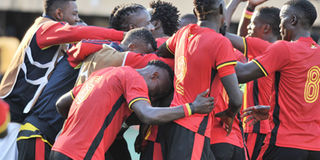Afcon grows to 24 teams

The Uganda Cranes team will have a new coach who will be unveiled today. File photo
What you need to know:
- Soccer. The decision was agreed upon after protracted deliberations at a Caf Symposium in Morocco.
Kampala. The Caf executive committee yesterday did ratify a proposal to expand the Africa Cup of Nations from 16 to 24 teams starting with the 2019 edition, which could imply an easy path for Uganda Cranes.
The national team already lead group L following a 1-0 victory in Cape Verde courtesy of a Geoffrey Sserunkuma strike in the 2019 edition qualifiers. Tanzania and Lesotho have a point apiece.
As Caf, headed by president Ahmad who won an election to end Issa Hayatou’s near-three-decade reign, certainly joins its European contemporary UEFA and world body Fifa in increasing the number of teams at their biennial flagship event, they might need to make changes to the ongoing qualification campaign.
UEFA grew their European championship from 16 to 24 while the World Cup will have 48 teams, up from 32, from 2022 following Fifa’s endorsement early this year.
No communication was offered in that regard with the body expected to make changes to the qualifiers in due course. Currently, 48 teams are drawn into 12 groups with the group winners going through.
Two second-placed teams and hosts Cameroon would then bring the total to 16. How will the eight be chosen with the 2019 qualifiers in motion?
“From a sporting perspective, it will allow more opportunity for footballers across the continent,” Nigerian Football Federation president Amaju Pinnick told the BBC in Rabat, Morocco.
Also the symposium, where Uganda had four representatives led by Fufa president Moses Magogo and chief executive officer Edgar Watson, recommended moving the tournament to June and July, instead of January and February.
But Africa’s flagship sporting event will still be played every two years as the tournament is a leading source of revenue for Caf, which would lose half of that money should the finals be played every four years, as some proposed.
There was no opposition to the change of the timing of the finals (June/July), which will please African players based at European clubs, who are regularly involved in a club-versus-country row every two years.
According to veteran African football journalist Mark Gleeson, the continental governing body could have ignored the weather pattern. “The huge negative is the weather,” Gleeson is quoted by AFP.
“It’ll be almost impossible for some countries in Africa to host the tournament because extremely hot and wet conditions in June will not be suitable for football.”
Some will also be angry with the sense that African football is being dictated to by European football. While the expansion will increase income but questions about diluting the quality of the competition will soon arise.
Caf might also soon grapple with nations having the right infrastructure to host eight more teams in terms of hotels and stadiums, the latter have often been criticized.
The two annual club competitions - the African Champions League and African Confederation Cup - are likely to run from August to May rather than inside a calendar year, as has been the case for decades.


